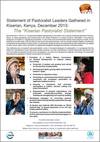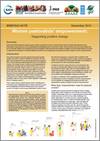Diciembre 9-15, 2013: 120 representantes de comunidades pastoriles de 48 países se dieron cita en Kiserian, Kenia, para compartir experiencias e inquietudes sobre la transición a una economía ecológica mundial. El pastoralismo –la producción ganadera extensiva en ecosistemas de pastizal– es uno de los sistemas alimentarios más respetuosos con el medio ambiente del mundo, pero la capacidad para proveer carne, leche y fibra, así como servicios ambientales, tales como la mitigación del cambio climático, la conservación de la biodiversidad y la protección de cuencas hidrográficas, se está erosionando continuamente debido a políticas e inversiones mal concebidas, a la inobservancia de los derechos humanos básicos, y a la interrupción de las prácticas adecuadas de gestión de pastizales, incluida la movilidad.
Year of publication: 2013Organization: Unión Internacional para la Conservación de la Naturaleza (IUCN), Programa de las Naciones Unidas para el Medio Ambiente (UNEP), Comisión Económica para África
Topic: Participación
Language: English, Français, Español
Type of document: Políticas y legislación
Geographical coverage: Global
This policy brief discusses how to best support women’s empowerment and gender equity. It concludes that interventions need to be start with pastoral women themselves. Empowerment is more sustainable when it comes from within. Women’s place and role in the pastoral communities needs to be understood and acknowledged. What empowerment means for pastoral women should influence how this is supported and achieved. The right institutional frameworks and supporting mechanisms are vital to support women’s empowerment.
Year of publication: 2013Organization: , Fondo Internacional de Desarrollo Agrícola (FIDA), Unión Internacional para la Conservación de la Naturaleza (IUCN), Programa de las Naciones Unidas para el Desarrollo (UNDP)
Topic: Género y juventud
Language: English
Type of document: Técnico, Políticas y legislación
Geographical coverage: Global
The real measure of success in the work that FAO does, is how effectively they help the most needy to live free of hunger, in better health and with stronger livelihoods. In 2013, FAO worked in north-eastern Uganda to explore how the concept of One Health can be implemented at the community level. This video highlights the work that the FAO team together with villagers, district health, agriculture and wildlife officials, and national decision-makers did to improve delivery of health services for pastoralists and their livestock. They identified brucellosis, a bacterial disease causing human suffering and livestock production losses, and took steps to assist in preventing this disease. Most importantly, the video shows how One Health teams can listen carefully to community members, both in setting health priorities and determining the best ways to help the community to improve their lives and livelihoods.
Year of publication: 2013Organization: Organización de las Naciones Unidas para la Alimentación y la Agricultura (FAO)
Topic: Seguridad alimentaria, Sanidad, Resiliencia
Language: English
Type of document: Videos
Geographical coverage: África Oriental
This report highlights the importance of pastoralist livestock mobility for the resilience of pastoralist livelihood systems and for maximising productivity. Tufts and partners monitored camel, sheep and cattle herds for up to five months in Darfur and Kordofan regions of Sudan. Using mixed methods and GPS tracking the study recorded in detail herd movements and management strategies in response to environmental parameters (the advancing rains and greening up of vegetation). The study highlights a diverse range of modernising trends and livelihood adaptations, including for example diversified investment strategies, herder responses to inter-tribal conflict in East Darfur and conflict avoidance strategies. Local case-studies present new evidence of a distinctive pastoralist approach to natural resource management that regulates access to natural resources rather than seeking to control numbers of animals. Not all trends are positive, and thus need to be analysed so as to support the positive while mitigating potential negative consequences.
A Policy Brief of the report can be found here.
Year of publication: 2013Organization:
Topic: Conflicto, Economía, Servicios ambientales, Seguridad alimentaria
Language: English
Type of document: Políticas y legislación
Geographical coverage: África Oriental
The representatives of the governments of the six countries of the Sahel (Burkina Faso, Chad, Mali, Mauritania, Niger, and Senegal) gathered in Nouakchott by invitation of the Government of the Islamic Republic of Mauritania, the Permanent Interstate Committee for Drought Control in the Sahel (CILSS), and the World Bank in collaboration with the African Union Commission, the Economic Community of West African States (ECOWAS), the West African Economic and Monetary Union (WAEMU), and the United Nations Food and Agriculture Organization (FAO) and in the presence of representatives of international and regional research organizations, civil society organizations, producers' organizations, the private sector, and technical and financial partners, for the purpose of strengthening the resilience of Sahelo-Saharan pastoral societies.
Year of publication: 2013Organization: Autores individuales
Topic: Participación
Language: English
Type of document: Políticas y legislación
Geographical coverage: África Occidental, África Central
This study gives an in–depth understanding of child labour in selected pastoralist communities in South Sudan. This information can be used to formulate and/or revise public policies and programmes on education and child labour elimination.
Year of publication: 2013Organization: Organización Internacional del Trabajo
Topic: Género y juventud
Language: English
Type of document: Técnico
Geographical coverage: África Oriental
Livestock production is a key income source in eastern Africa, and 80% of the total agricultural land is used for livestock herding. Hence, ecological and socio-economically sustainable rangeland management is crucial. This study aimed at selecting operational economic, environmental and social sustainability indicators for three main pastoral (P), agro-pastoral (AP), and landless intensive (LI) small-scale livestock production systems for use in sustainability assessment in Ethiopia. The study concluded that sustainability indicators are valuable tools to highlight shortcomings and strengths of the three main livestock production systems and help with future livestock management in Ethiopia. Selecting suitable indicators, however, is crucial as data requirements and availability can vary across livestock systems
Year of publication: 2013Organization: Autores individuales
Topic: Seguridad alimentaria, Resiliencia
Language: English
Type of document: Técnico
Geographical coverage: África Oriental
Much has been made of the ‘ungoverned spaces’ of the Sahara, impossible for government to police. While it is true that parts of the Sahara are difficult to patrol and manage, it is not all uninhabitable or uninhabited: some areas are home to pastoral nomads. But these areas also provide shelter for a growing band of jihadists. They share the mountains and Sahelian fringes and are a major cause of concern for the Mali government. To limit jihadist influence will require immediate strategies: concerted effort to reconcile southern Mali with the north, and new policies to rebuild the northern pastoral economy. This should be a regional approach, to include rebuilding links to southern Mali and to neighbouring countries. A stronger pastoral society, supported by a border force could control the potential jihadist threat and contribute to national reconciliation.
Year of publication: 2013Organization: Instituto Internacional de Medio Ambiente y Desarrollo (IIED)
Topic: Conflicto, Tierra
Language: English
Type of document: Técnico, Políticas y legislación
Geographical coverage: África Occidental









